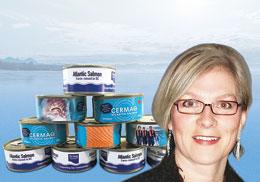Salmon farmers give a boost to BC food banks

By SeaWestNews
Providing food to those in need can be difficult at the best of times for Canada’s food banks. With COVID-19, this task just got harder.
Food Banks Canada says demand at the 3,000 food agencies it represents across the country, could surge to 30 to 40 per cent because of COVID-19’s devastating economic impact. Prior to the pandemic, the food agencies averaged 1.1 million visits per month.
In British Columbia, food banks help nearly 100,000 individuals – one in three a child - and the increase in demand is expected to last beyond the pandemic as the economy slowly bounces back.
“In some instances, numbers have already doubled and we’re seeing line ups grow longer, yet food donations are down. Some people who were donors are now food bank recipients,” said Laura Lansink, Executive Director of Food Banks BC.
“It’s a very stressful situation for our food banks and we anticipate we will feel the repercussions of this for one or two years into the future.”
To boost the continued supply of nutritious protein to those in need, the BC Salmon Farmers Association (BCSFA) today announced the creation of a salmon donation initiative with Food Banks Canada and Food Banks BC to feed families during the COVID-19 pandemic.
Cermaq Canada, Grieg Seafood BC, Mowi Canada West, Creative Salmon and Golden Eagle Aquaculture are donating around 60,000 pounds of salmon to food banks that are seeing increased demand. Together, this industry donation will supply the equivalent of over 200,000 meals to British Columbians during the COVID-19 pandemic.
The BC salmon farmers’ donation will include:
• 86,000 cans of Atlantic salmon: Cermaq and Grieg have donated fresh Atlantic salmon, which has been processed and canned by St. Jean’s Cannery & Smokehouse in Nanaimo, to Food Banks BC. From there, the salmon will be distributed to food banks on Vancouver Island and throughout the province.
• 1,000 pounds of Atlantic salmon per week: Each week Mowi is distributing 1,000 one-pound portions of Atlantic salmon to food banks in Campbell River and Port Hardy. They have partnered with a Port Hardy company, Hardy Buoys Smoked Fish, to produce the portions for weekly delivery for the length of this crisis.
• Canned Pacific salmon: Golden Eagle Aquaculture is donating multiple cases of canned land-grown coho salmon to food banks. Creative Salmon, which farms organic Chinook salmon off Vancouver Island’s west coast, is also donating canned salmon to help support food distribution efforts in the Tofino and Ucluelet area.
• Transportation. Aquatrans Distributors Inc. is donating most transportation costs of the salmon to St. Jean’s for canning and to five BC food bank hubs for distribution.
“I have been with Food Banks BC for almost a decade and I have never received a donation like this before,” Lansink said.
“Protein donations truly are hard to come by, so we are so grateful to BC salmon farmers for stepping up, particularly at this time of COVID-19 when food, and especially protein, is in such short supply. This donation will make a tremendous impact on the individuals, families and children who simply can’t always afford to put food on their tables.”
John Paul Fraser, Executive Director of the BCSFA said : “This is a time for all industries to step up and support those most affected by COVID-19, and that’s exactly what BC’s salmon farmers are doing.”
This is not the first time, BC salmon farmers are coming to the fore in the fight against COVID-19.
In March, Cermaq, Grieg and Mowi donated barrels of Hydrogen Peroxide to Shelter Point Distillery to help create hand sanitizer for frontline workers on the North-Central Island
Vancouver Island’s Shelter Point Distillery, which is world renowned for its artisanal whisky, vodka and gin, has suspended its distilling operations in order to switch production to manufacturing medical grade sanitizer.
Hydrogen peroxide or H2O2 is a chemical compound that’s a combination of hydrogen and water. It is one of the longest-running and most widely solutions used for delousing treatments employed by salmon aquaculture. When hydrogen peroxide hits the sea, it breaks down into its natural components – hydrogen and oxygen – making it one of the most environmentally friendly solutions available.
Earlier this month, Canada said it will pump $62.5 million into the wild and farmed fisheries sectors and the seafood production industry to ensure the collective food security of the nation.
Shawn Hall, the spokesperson for the B.C. Salmon Farmers, said his association is awaiting details to understand what opportunities and resources will exist for the province’s salmon fishery.
“The pandemic has created economic challenges, and our production has shifted,” he said.
“In typical times, many BC salmon farmers sell a significant amount of fish into restaurants and hotels, which are necessarily curtailing business at this time.
However, retail sales are stable and actually increasing in some markets as families look for healthy meals to cook at home. That does not make up for declines in restaurant sales, but it helps. The situation is challenging, but we are resilient.”
Consistently ranked as the 4th largest farmed Atlantic salmon producer in the world, farmed salmon is B.C.’s highest valued seafood product, the province’s top agricultural export and generates over $1.5 billion towards the B.C. economy.
There are approximately 7,000 total full-time equivalents (FTE) positions supported by the B.C. salmon farming industry. In B.C., 86% of the province’s salmon harvest salmon comes from farms.
The 196,300-tonne commercial fishery 2018 harvest generated a total landed value of $476.4 million – up 19.7percent over 2017.
Across Canada, about 72,000 people are employed by the fishing industry in primary harvesting, aquaculture or processing. In 2018, Canada exported a whopping $6.9 billion in fish and seafood products to nearly 140 countries worldwide.






